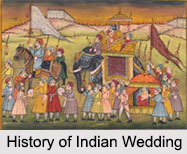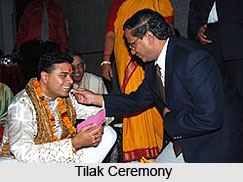 North Indian Weddings with all their splendor and brilliance have cast its spell on so many foreigners that there are numerous people who consider getting married in India. Consequently wedding tourism in India has gained immense popularity. Apart from the lavishness, another outstanding feature of North Indian weddings is their loyalty to customs and traditions. As is the case with other parts of India, North Indian weddings follow many common rituals and customs. North Indian wedding traditions include many rites and rituals performed on the main day.
North Indian Weddings with all their splendor and brilliance have cast its spell on so many foreigners that there are numerous people who consider getting married in India. Consequently wedding tourism in India has gained immense popularity. Apart from the lavishness, another outstanding feature of North Indian weddings is their loyalty to customs and traditions. As is the case with other parts of India, North Indian weddings follow many common rituals and customs. North Indian wedding traditions include many rites and rituals performed on the main day.
In traditional North Indian weddings, the main ritual is observed at the brides` home. There are many pre-wedding and post-wedding ceremonies as well. The most important of the former is the Mangni or Sagai or engagement ceremony. On the auspicious day of the wedding, the bride`s father treats the groom to yogurt, honey, and courteously welcomes him into the household. One of the most important of North Indian wedding traditions is the exchange of garlands, commonly referred to as the Jaimala ceremony and is emblematic of accepting one another.
The ceremonial fire or Havan is lit and Agni is invoked to make it a holy witness of the occasion. Fire is believed to be the purifying element in Hindu rites and rituals. The couple then offers sacrifice or Rajaham in to the fire. This is distinctive to North Indian wedding traditions. The ritual that follows is the Gath Bandhan and is symbolic to eternal ties. Then it is the turn of what is regarded as the most important all North Indian wedding traditions - the Saat Phere or Mangal Phere. The bride and groom circle the fire often-holding hands and take vows to be beside each other all through their lives. Both sets of parents and other elders of the family then bless the newly wedded couple.
North Indian wedding traditions also include putting on the Mangalsutra as well and application of vermilion on the bride`s head by the groom. These rituals have a deeper symbolic relevance and a certain quaint charm and appeal. It is no wonder then that they enamor even foreigners. If you are one of those who choose to marry following the North Indian wedding traditions, it is the simplest to avail any special wedding tour packages on offer by Indian Holiday. There are many remarkable wedding venues in North India and a splendid wedding in any of them is sure to remain permanent in the attendee`s memories forever.
Kinds of Indian Wedding
More on Indian Wedding Accessories
More on Indian Religious Weddings
More on Types of Marriages
See also
 North Indian Weddings with all their splendor and brilliance have cast its spell on so many foreigners that there are numerous people who consider getting married in India. Consequently wedding tourism in India has gained immense popularity. Apart from the lavishness, another outstanding feature of North Indian weddings is their loyalty to customs and traditions. As is the case with other parts of India, North Indian weddings follow many common rituals and customs. North Indian wedding traditions include many rites and rituals performed on the main day.
North Indian Weddings with all their splendor and brilliance have cast its spell on so many foreigners that there are numerous people who consider getting married in India. Consequently wedding tourism in India has gained immense popularity. Apart from the lavishness, another outstanding feature of North Indian weddings is their loyalty to customs and traditions. As is the case with other parts of India, North Indian weddings follow many common rituals and customs. North Indian wedding traditions include many rites and rituals performed on the main day.



















